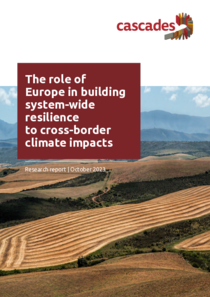The role of Europe in building system-wide resilience to cross-border climate impacts

2023
114 p.
globalization ; migration ; climate change ; risk assessment ; international cooperation
Research Report
October 2023
Migration
English
Bibliogr.
"In a globalised world, economies, societies, and ecosystems are interconnected through multiple flows, such as trade links and global markets, financial interdependencies, and people's movement. When climate events such as droughts and flooding occur in one part of the world, the consequences can be transmitted to other countries, regions, and continents. These cascading or cross-border climate impacts traverse national borders and jurisdictional boundaries, posing risks to countries and communities distant from the initial origin of impact. For example, in a region like the Middle East and North Africa (MENA), a combination of higher temperatures and water shortages could reduce agricultural yields, causing disruptions in food value chains and potentially leading people to move out of agriculture due to reduced opportunities. Consequently, increased rural-urban migration could strain public services such as water, energy, and food. These factors can exacerbate social unrest and regional instability, increasing migration towards Europe. Unsafe or illegal migration may create opportunities for organised crime (e.g., human trafficking) and entail various risks for migrants (e.g., accidents, violence, exploitation).
Agri-food systems are often crucial in risk cascades that connect climatic shocks with other challenges, such as disrupted economies or displacements. They also are a logical entry point for interrupting such cascades early on and for preventing climate shocks from propagating across domains (e.g., food, economy, health, security) and borders..."
Digital
The ETUI is co-funded by the European Union. Views and opinions expressed are however those of the author(s) only and do not necessarily reflect those of the European Union or the ETUI.